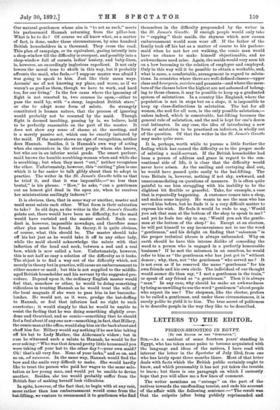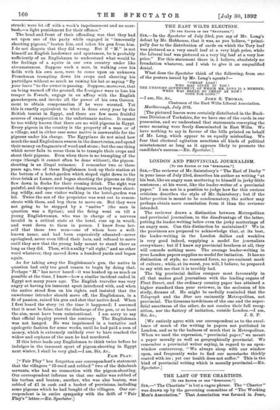LETTERS TO THE EDITOR.
PIGEON-SHOOTING IN EGYPT.
[To Tin EDITOR Or THE "SracTAToa.°] Sin,—As a resident of some fourteen years' standing in Egypt, who has taken some pains to become acquainted with the language and ideas of the natives, I have read with interest the letter in the Spectator of July 23rd, from one who has lately spent three months there. Most of that letter deals with facts which the British public certainly ought to know, and which presumably it has not yet taken the trouble to learn; but there is one paragraph on which I earnestly hope that you will allow me a few lines of comment.
The writer mentions an " outrage " on the part of the natives towards the nnoffending tourist, and ends his account of the affair with the following sentence :—" The result was that the culprits (after being publicly reprimanded and.
struck) were let off with a week's imprisonment and no cour- bash,—a light punishment for their offence."
The head and front of their offending was that they had
set upon one of the party while engaged in "innocently shooting pigeons," beaten him, and taken his gun from him. I do not dispute that they did wrong. But if "M." is not himself an English landowner and sportsman, he is probably sufficiently of an Englishman to understand what would be the feelings of a squire in our own country under like circumstances. Suppose such a man, in walking over his fields with his own men, were to come upon an unknown Frenchman trampling down his crops and shooting his partridges without so much as raising his bat or saying "By your leave "to the owner in passing. Suppose, moreover, that on being warned off the ground, the foreigner were to lose his temper in French, engage in an affray with the English gamekeepers, and invoke all the power of his own Govern ment to obtain compensation if he were worsted. Yet this is exactly equivalent to what is done every year by the British tourist in Egypt, and there are few more fruitful sources of exasperation to the unfortunate native. It cannot be too widely known that there are no wild pigeons in Egypt. Every pigeon in the country is the property of a man or of a village, and in either case some native is answerable for the pigeons under his charge. The Egyptians do not mind how much the mad Englishmen swarm in the desert ruins, and spend their money on fragments of wood and stone ; but the one thing which never fails to rouse them is to trample their crops and shoot their pigeons. Even when there is no trampling of the crops (though it cannot often be done without), the pigeon- shooting is an illegal nuisance. I remember two or three years ago, two of these Englishmen took up their station at the bottom of a hotel-garden which sloped right down to the river-brink at Luxor, and began shooting the pigeons as they flew down in flocks for their evening drink. The sight was painful, and the sport somewhat dangerous, as they were shoot- ing wildly, and one visitor walking in the hotel-garden was hit. Twice the son of the proprietor was sent out to remon- strate with them, and beg them to move on. But they were not going to be stopped by a " native " (the man in question was a Syrian), and the firing went on till a young Englishwoman, who was in charge of a nervous invalid in a critical state at the hotel, rose up in wrath, and went down to them in person. I know from her- self that these two men—one of whom bore a well- known name, and had been expensively educated—never apologised, never even lifted their hats, and refused to move until they saw that the young lady meant to stand there as long as they did. Then, with a sulky "all right," and no other word whatever, they moved down a hundred yards and began again.
As for taking away the Englishman's gun, the native in question had only too good reason to begin by doing that. Perhaps "M." has never heard—it was hushed up as much as possible at the time, I know—how a similar incident ended in Egypt not many years ago. The English traveller was very angry at having his innocent sport interfered with, and when the native stood firm on his rights, and insisted that the unwelcome intruder should move off, the Englishman, in a fit of passion, raised his gun and shot that native dead. When I first heard the story (at the time it happened) I assumed that it must be false, that the discharge of the gun, or at least the aim, must have been unintentional. I am sorry to say that official inquiry proved the contrary. The Englishman was not hanged. He was imprisoned in a tentative and apologetic fashion for some weeks, until he had paid a sum of money, which is extremely unlikely ever to have reached the widow and orphans of the man he had murdered.
If this letter leads any Englishman to think twice before he indulges in the innocent sport of pigeon-shooting in Egypt next winter, I shall be very glad.—I am, Sir, &c., FAIR PLAY. [" Fair Play" has forgotten our correspondent's statement that the villagers "ill-used and robbed" two of the dahabeah servants, who had no connection with the pigeon-shooting. Our correspondent informs us that one sailor was robbed of his turban and beaten; another, who was also beaten, was robbed of 21 in cash and a basket of provisions, including some pigeons which he had bought of the villagers. Our cor-
respondent is in entire sympathy with the drift of "Fair Play's" letter.—En. Spectator.]



































 Previous page
Previous page